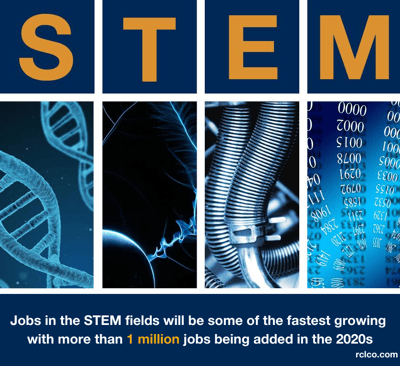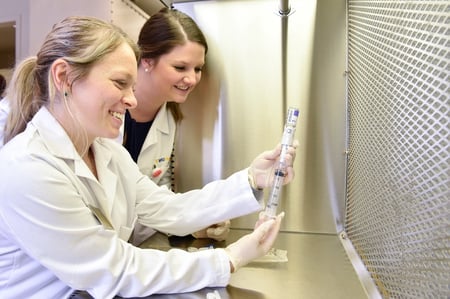If you are looking for a strong return on investment from your career, now is an ideal time to be thinking about pursuing an advanced STEM education. In fact, the Bureau of Labor Statistics (BLS) projects that jobs in the STEM fields will be some of the fastest growing and most profitable careers across all industries — with more than 1 million jobs being added in the 2020s.
We took the liberty of exploring several STEM master's degrees that we think are worth pursuing in the next few years.
"The future of the economy is in STEM education ... that's where the jobs of tomorrow will be." — James Brown, Executive Director of the STEM Education Coalition in Washington D.C.
Whether you're already working or studying in this field, or simply needing to make a change, these STEM master's degrees will launch you into the next phase of your STEM career. These STEM master's degrees set you apart from the rest of the candidate pool and establish you as an innovative expert in your field.
1. Software Engineering
The Master of Software Engineering offered by WVU's Lane Department of Computer Science and Electrical Engineering will provide you with the expertise to better understand the holistic design, development, and management processes of software applications and systems. You will learn how to identify and analyze user and client needs, while gaining the skills necessary to implement or create software-based solutions.
Software engineering is one of the most in-demand and fastest growing occupational fields in the country, with careers in any number of industries including technology, healthcare, automotive manufacturing, green energy, remote sensing, aeronautics and finance.
2. Material Science and Engineering
WVU's Material Science and Engineering graduate program is designed for students with undergraduate degrees in engineering or a closely related STEM discipline.
This program provides students with opportunities to investigate various aspects of material science and engineering, which includes the processing, structure, and properties of materials through computational modeling and/or experimental studies.
3. Data Analytics
The online Master of Science in Business Data Analytics graduate program, offered by the John Chambers College of Business and Economics, equips students to develop expertise in statistical techniques, data mining, utilizing databases, and analytical tools.
Students who graduate from WVU with the Business Data Analytics M.S. degree may be prepared for the following careers: Quality Control Analyst, Business Intelligence Analyst, Statistician, Business Operations Specialist, and Database Administrator.
4. Cybersecurity
WVU’s Master of Science in Business Cybersecurity Management offered by the WVU John Chambers College of Business and Economics is designed to address the significant need for cybersecurity talent.
The degree is built to equip the motivated student with the toolkit to engage, lead and own the cybersecurity business career path. You will be prepared to hold a number of diverse positions, to include security analyst, network security engineer, information security manager and security administrator.
5. Biology
WVU's Department of Biology offers graduate courses and research that lead to M.S. and Ph.D. degrees in the focal areas of Ecology, Bioinformatics, Genetics, Genomics and Evolutionary Biology, Biochemistry and Molecular Biology, Neurobiology, Behavior and Physiology, Plant Sciences, Cell and Developmental Biology, Biology Education and Forensic Biology.
Students from the Master of Science in Biology program consistently become leaders in their field with new discoveries and innovations. In many professions, the master's degree is now the minimum requirement for employment or advancement. Many students have used our M.S. in biology to launch to careers in research and the health professions.
6. Petroleum and Natural Gas Engineering
The Master of Science in Petroleum and Natural Gas Engineering is one of only three ABET accredited programs encompassing both petroleum and natural gas engineering in the country.
Graduates of this program are in heavy demand, receiving excellent job offers both close to home and around the world. Because WVU is centrally located near major oil and gas fields, our students have the opportunity to interact with members of our industry. Through site visits, seminars, summer jobs, and socialization, students get to know these industry personnel on a personal and professional level.
7. Nursing
Nursing is one of the most impactful fields today. And for nurse practitioners, the field is experiencing an astounding job growth rate of 40 percent, making it one of the most booming industries as well.
The Master of Science in Nursing offers baccalaureate prepared nurses the opportunity to earn a master’s degree. The program offers a curriculum that allows students to enroll on a part- or full-time basis. Current specialty tracks prepare students to certify as pediatric or family nurse practitioners.
8. Mining Engineering
Mining engineers deal with the science and technology of extracting and processing minerals from a naturally occurring environment. The Mining Engineering graduate program at WVU, which is one of only 15 mining engineering programs in the United States, dates back to 1868 when the first mine surveying course was offered.
The master's in mining engineering program is built on advanced mining engineering fundamentals. In this program, students will perform research leading to an original thesis in areas such as surface mining, rock mechanics and ground control, mineral processing, mine subsidence engineering and mine ventilation.
9. Physics
A STEM field that continues to provide significant research and discovery with growth opportunities is physics. The U.S. Bureau of Labor Statistics projects that the employment of physicists will grow 5 percent from 2022 to 2032.
WVU's Master of Science in Physics gives a fundamental theoretical background beyond that of undergraduate level and some research experience, if desired. In addition to completing core courses, master’s students can choose a research-based thesis option or advanced electives in astronomy, electrodynamics, plasma physics, quantum physics, and solid-state physics.
10. Biostatistics
West Virginia University's Department of Biostatistics, created in 2012, aims to develop and implement biostatistical methodology in collaborative research with colleagues across the WVU Health Sciences Center.
WVU's Master of Science in Biostatistics program focuses on training students to design studies, and to model and interpret data arising from research in health and medicine.
11. Robotics
While West Virginia University does not offer a graduate degree in Robotics, WVU does offer a renowned Robotics program that is led by talented professionals who lead, collaborate, and inspire graduate students who are passionate about the field of robotics engineering.
Fueled by a spirit of innovation, the Robotics program is designed to perpetuate academic excellence and advancement of knowledge.
Graduate students who participate in the Robotics program come from degree programs such as:
-
Aerospace Engineering
-
Biomedical Engineering
-
Chemical Engineering
-
Civil Engineering
-
Computer Engineering
Join a community of experts in STEM education at WVU
It's an understatement to say that the field of STEM education is competitive, multifaceted, and not for the faint of heart or mind.
And as an aspiring leader in a STEM field, there's no better way to establish yourself as an expert than to pursue a graduate degree in your field of interest, especially at an R1 institution like West Virginia University.
Pro tip: Check out this blog post, Exploring WVU’s R1 Status — What it Means to be a Carnegie R1 Institution, to learn more about what it means to choose an R1 institution.
We hope you'll request more information today, or if you're ready to join the WVU community, you can start your online application today!
As an aspiring leader in STEM education, we invite you to explore our resource — A Guide to Graduate Programs and Careers in STEM!















